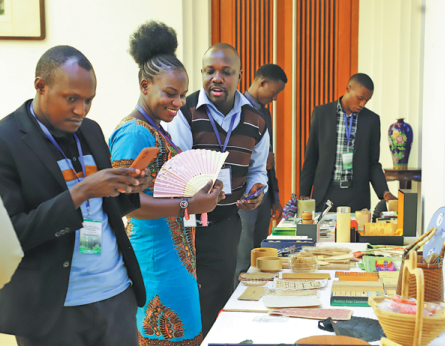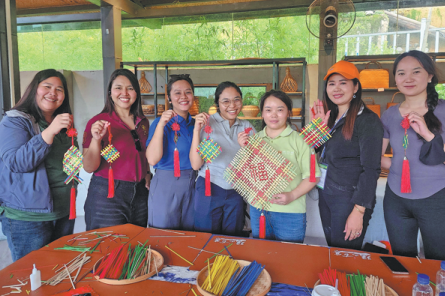Experts share experiences in environmental governance
International training programs promote knowledge, technical expertise for better approaches to forestry, conservation and climate change

China's aid training programs on environment and ecology, which invite participants from around the world, are helping build capacity in many countries, according to a Kenyan official who attended a training session in Beijing in June.
Mary Ivy Wanjiku Kimama, a senior research scientist at the Kenya Forestry Research Institute, attended a seminar on forest ecological protection and restoration for developing countries from June to July. "I came here because I wanted to see China's forestry practices and bring these ideas back home," she said. "It's impressive to see that it takes only 10 minutes in China to mobilize for forest fire fighting."
Under China's aid training program, officials and technical experts from various countries eager to tackle climate challenges gathered in Beijing to learn from China's experience in ecological and environmental governance.
Rajendra Phuyal, former secretary of Nepal's National Assembly, also took part in the training. He praised the program for combining theoretical, technical and practical knowledge on environmental conservation and sustainable development. "It provides an opportunity to interact with delegates from other countries, which promotes information exchange and sharing of experiences," he said.
Inspired by China's tech-driven approach to forest conservation and management, he said, "The use of satellite monitoring, satellite tracking and coordinated forest management systems could greatly enhance our capacity to respond to disasters and protect our forests."
From June to July, several training programs were held at the National Academy of Forestry and Grassland Administration in Beijing. The sessions brought together officials, foresters and scholars from countries including Egypt, Fiji, Romania, Malaysia, South Africa, Ethiopia, Nepal, Kenya, Thailand and the Solomon Islands.
These programs focused on topics such as forest resource utilization under climate change, forest protection and restoration, biodiversity conservation and the development of the bamboo industry and green economy, with some seminars specifically designed for developing countries.
Running since 2007, the seminars are organized by the NAFGA as part of the aid training framework of the Ministry of Commerce and the China International Development Cooperation Agency.
During the two-week seminar, instructors from various institutions explained China's environmental systems, policies, practices and technologies. For example, the forestry seminar covered topics such as forest law, the application of monitoring technologies in forestry surveys and collective forest ownership in China.
Sera Vere, a forest ranger from Fiji's Ministry of Forestry, said the program was an opportunity to strengthen her skills in modern forest monitoring and to contribute more effectively to Fiji's sustainable forest management under climate change.
"China's use of advanced satellite and drone technologies to map forest cover, monitor changes and assess biomass can be directly applied to my work in forest resource assessment in Fiji," she said.
She noted that one of the biggest challenges in Fiji is the lack of structured incentives or compensation for communities engaged in tree planting. "This training introduced the concept of carbon trading, where communities can benefit financially by maintaining and restoring forests," she said.
Agnes-Zsuzsa Keresztesi, scientific director of the Research and Development Institute for Wildlife and Mountain Resources in Romania, said she was particularly interested in China's practices to mitigate human-wildlife conflict. "The training offered valuable insights into building an elephant-smart community and ecological corridors in China, which I can apply to help reduce conflicts between brown bears and humans in our region and build a bear-smart community," she said.
According to Bian Mingming, director for international cooperation and the aid training programs at NAFGA, more than 100 training programs have been organized since 2007, including 24 online and over 70 in-person sessions. "More than 5,000 participants from over 100 countries have attended NAFGA training programs," he said.
Jiang Kejuan, a researcher at the Energy Research Institute of the National Development and Reform Commission, has been teaching seminars in the program for about six years. He said the seminar is designed to share China's development experience, particularly in areas of interest to developing countries, such as the net-zero transition and climate change response.
"These developing countries are going through challenges similar to those we faced on our own development path. We have successful experiences to share, as well as lessons learned from our mistakes. These seminars share China's ideas, technologies and commitment to cooperation with the rest of the world," he said.
After class, many students approached Jiang with questions. "I can see their eagerness to learn," he said.
Each seminar also includes thematic field trips to various cities. For example, in June, one class visited Xinyang in Henan province to learn about forestry eco-tourism, tea planting and ancient tree conservation. Another group visited Mohe in Heilongjiang province to see the digital management of forest fire prevention.
Ahmed Allam Mohamed Hamadalla from Egypt's Institute of Environment under the Ministry of Environment joined the trip to Xinyang on his second visit to China. "I learned about tree conservation and tea cultivation with minimal pollution," he said. "China's training programs truly meet the needs of developing countries."
After visiting Mohe, Zandile Monokoane from South Africa said she was inspired by how different generations in China have worked together to build infrastructure and forests. "China ensures that everyone understands the importance of preserving the environment," she said.
"China and other developing nations share common challenges, such as how to balance development and protection," Bian noted.
"The practices and examples of China's concept 'lucid waters and lush mountains are invaluable assets' offer important lessons for the ecological governance of developing countries and contribute Chinese solutions to building a community with a shared future for humanity," he said.




Today's Top News
- More grads chart career paths in west of China
- Why China's AI initiative is critically important
- Israel's Gaza takeover plan widely condemned
- S. Korea visa waiver spurs surge in travel interest
- Top cities signal easing to support property market
- Ties help bolster heritage protection






























